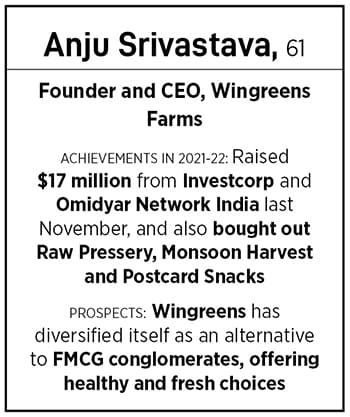
Forbes India 2022 W-Power: Anju Srivastava's Wingreens Farms is about empowering farmers
Anju Srivastava wants people to realise that doing business thoughtfully is the future. And with Wingreens Farms, she is leading by example by empowering farmers and their families
 Anju Srivastava, Founder and CEO Wingreen Farms
Anju Srivastava, Founder and CEO Wingreen Farms
At heart, Anju Srivastava is a conscious capitalist. That’s precisely why, when she began her entrepreneurial journey, one of the first things she focussed on was the welfare of farmers and women, who were going to help her in her business. “How can you be happy when everything around you is not as happy?” Srivastava says. “So, honestly, it’s not about being a philanthropist or being compassionate. It’s just the way I can be happy.”
Srivastava is founder and CEO of Wingreens Farms, a Gurugram-headquartered maker of chips, dips, sauces and healthy snacks. In recent times, it has brought under its fold popular brands such as Raw Pressery, a Mumbai-based maker of cold-pressed juices, shakes and milk, Coimbatore-based cereal maker Monsoon Harvest, and Bengaluru-based snacks maker Postcard Snacks.
Wingreens started out as a pilot project in 2012 when Srivastava returned to India after a stint in the US. An advertising professional, she first began by selling potted herb plants, a practice common in the US. However, that was a business that was hard to scale, and soon, Srivastava decided to use fresh herbs to make sauces and dips. “The potted herbs were not a scalable business,” she says. “We had lots of basil that season and so we started making basil pesto.” That was a hit in stores, and soon, Srivastava knew she had a business at hand.
 The company doesn’t own any land for its farm cultivation. Wingreens grows its herbs for its dips and sauces on 15 acres of land that they have rented. “It’s still a pilot project,” Srivastava says. “But now, we can extend it to any extent that we wish.”
The company doesn’t own any land for its farm cultivation. Wingreens grows its herbs for its dips and sauces on 15 acres of land that they have rented. “It’s still a pilot project,” Srivastava says. “But now, we can extend it to any extent that we wish.”
In the process, however, one of the key focuses for Srivastava while building Wingreens was the welfare of farmers and their families. “When farmers have land that is worth so much, how is it that they do not have liquidity?” Srivastava asks. “Secondly, understanding that the crops that they grow are not giving them the kind of returns was also important.”
(This story appears in the 30 November, -0001 issue of Forbes India. To visit our Archives, click here.)









